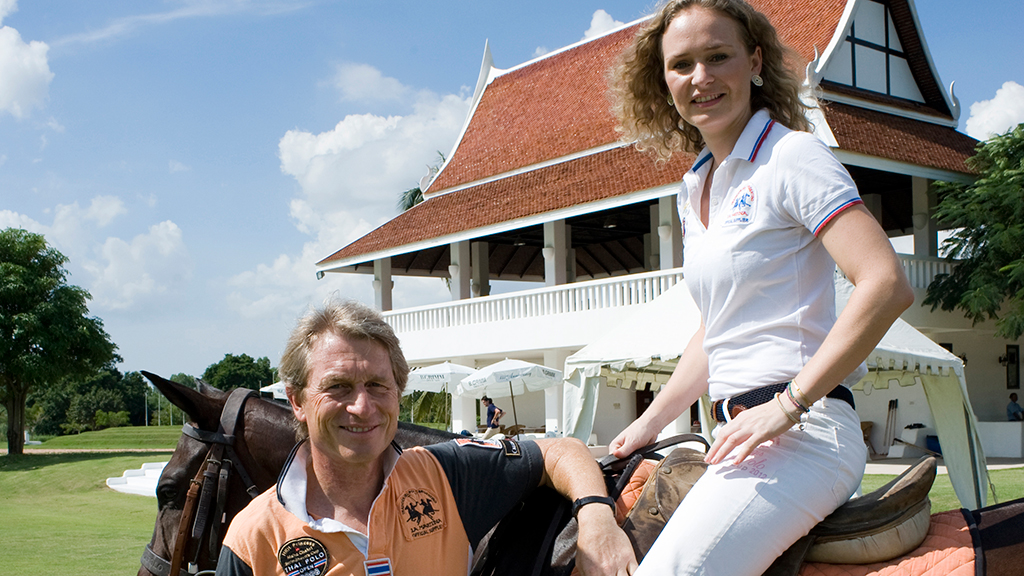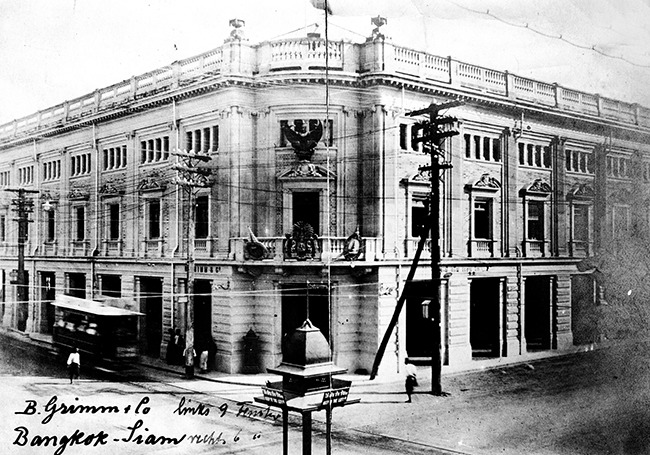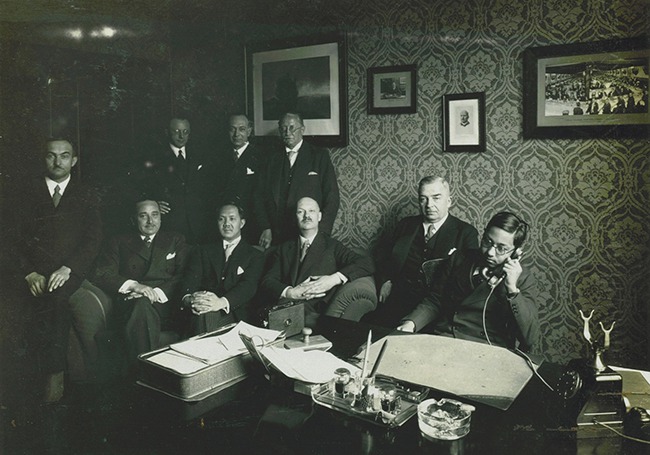 Harald Link and daughter Caroline find time for polo with British and Asian royalty. Credit: Peter Charlesworth for Forbes
Harald Link and daughter Caroline find time for polo with British and Asian royalty. Credit: Peter Charlesworth for Forbes
By Brian Mertens
If all goes as planned, B. Grimm & Co. will, within a handful of years, become Thailand’s first industrial conglomerate headed by a young, blonde-haired Thai who is the polo-playing daughter of a titled princess of Liechtenstein. This might seem out of the ordinary, but so is the company that Caroline Link, 33, is being groomed to lead.
B. Grimm began in Bangkok 137 years ago and today is led by Caroline’s father, Harald Link, 60, a naturalized Thai and a grandson of one of its German-born early owners. Following double-digit annual growth in recent years, the privately held group reached $1 billion in revenue and roughly $80 million in net profits last year. Two-thirds of sales are from nine power plants in Thailand and Vietnam. In health care it manufactures and imports medical products in joint ventures with such companies as Merck and Zeiss. In transportation it procures equipment such as Siemens rolling stock for Bangkok’s elevated and underground mass transit systems. It led the consortium that built the city’s train to the airport and owns five high-end dry bulk ships. Then there is cooling equipment, biodiesel fuel, real estate, licensed New York Metropolitan Museum of Art stores, a restaurant, e-commerce and a polo club with three fields and 300 ponies.
The company boasts 1,750 employees and will need many more to pursue its expansion plans. Unfortunately, the challenge facing B. Grimm and other Thai companies is finding good recruits. A growing labor shortage in Thailand means there’s a shortage of skilled people to hire, which is partly the result of Southeast Asia’s fastest-aging population. Unemployment has dipped to as low as 0.7% in recent years, among the world’s lowest rates. And too few job seekers have the skills that industry needs.
This scenario makes Caroline an apt successor. Extroverted and people-oriented, she is keen on human resource development and building on B. Grimm’s reputation for cultivating a great workplace. “Corporate culture is not a small thing anymore,” she says. “It’s the core! Companies want a good culture because it attracts good people. And they want to improve it to fit the new generation and get people from everywhere to join. People want to work hard until a certain hour, but family life is more important. Work-life balance has been B. Grimm’s culture since my great-grandfather’s time. It’s European.”
Another part of the corporate culture is resilience. That’s been a hallmark of B. Grimm’s long history, a tale of survival and tumult with enough real-life drama for a TV series. The opening shot of this docudrama might be a view of the Kingdom of Siam in the 1890s. Then zoom in on a swampy rural province just north of Bangkok, where legions of workers toil on Asia’s largest infrastructure project of its time, a grid of 1,500 kilometers of irrigation canals being dug to build up Siam’s rice-export industry. The contractors are B. Grimm & Co., founded in 1878 as Siam Dispensary by German pharmacist Bernhard Grimm and Erwin Mueller of Austria.
Cut to scenes of B. Grimm’s European engineers and managers aiding Siam’s other efforts to modernize in the late 19th and early 20th centuries, installing infrastructure such as telegraph and telephone lines, opening a department store and jeweler’s shop, importing machinery and ceramics–even the colorful tiles that clad Bangkok’s riverside Temple of Dawn, whose tower is a symbol of the capital and part of the company’s logo.

B. Grimm’s headquarters in Bangkok in 1912.
Flash forward to 1903, when German pharmacist Adolf Link (Caroline’s great-grandfather) answers a help-wanted ad and joins to expand the company. He buys the shares when the founders retire in 1914.
Next , a prison camp in India in World War I, where the British hold Link, his wife and their two sons after expropriating B. Grimm. He starts it up again in 1928 with new operations, such as importing Mercedes-Benz cars.
World War II. Company seized again. In 1949 son Herbert relaunches it. Son Gerhard (Caroline’s grandfather) stays in Germany, becoming Thailand’s consul-general in Hamburg, where his son Harald grows up along the posh shores of Alster Lake and in the 750-year-old castle of his maternal grandmother’s family in Boedigheim.
Then, in Bangkok in 1978, 23-year-old Harald arrives from Germany to join his Uncle Herbert’s version of
B. Grimm, now a supplier of European pharmaceuticals and gear for power generation and air-conditioning. In 1981 he marries Princess Assunta von Liechtenstein.

Prince Prem Purachatra, son of Siam’s minister of transport and communications, places the first telephone call from Thailand to Germany in the 1930s on a system supplied by B. Grimm. Seated next to him is Adolf Link, Caroline’s great-grandfather.
Harald becomes chief executive in 1987, not long after the Thai currency falls by half against the deutsche mark, imperiling B. Grimm’s business model as a technology importer. He quickly leads the company back into profit, replacing foreign managers with locals. With Thais in charge throughout the company, it grows steadily.
Close with scenes of a polo club, where Harald and daughter take to the field with the likes of Prince Harry, Prince William and members of Southeast Asian royalty.
Off their polo ponies, the Links are deep into the nitty-gritty of business. “Maybe part of the reason we are doing well is that we combined the German and Thai cultures,” says Caroline. “Germans are serious and professional; Thais are flexible, positive and creative. Germans are always criticizing, talking about risk. But Thais say, ‘Well, we can overcome it.’ Because they’re creative at finding solutions.”
One Link solution to the labor shortage is apprenticeships, true to German tradition. Caroline is now in her eighth, a three-year stint as a Hong Kong-based pharmaceuticals marketing executive for Merck. Previously she worked in shipping, property, corporate communications, banking and retail at the family business and others. “It’s important that I gain experience in different areas because we’re a diversified company with many different management styles,” she says.
Harald, too, paid his dues. As a student of mechanical engineering and business, he did six apprenticeships. He learned to lathe, file, weld and forge, and to make his own tools. “All your life in school you have just been sitting at a desk, and then in your first day of training you have to stand for eight hours and do nothing but file,” says Harald.
He is now busy championing the hands-on approach. In the past four years B. Grimm has worked to roll out German-style work-study education in Thailand, in cooperation with government vocational schools, an effort that’s been joined by German, Japanese and American firms. It’s called dual vocational training. Students move between classroom study and workplace training, with host companies guiding the curriculum.
The two-year diploma program aims to solve another problem by letting students earn a bachelor’s degree with two additional years of school, the better to please their families. A big reason that Thailand lacks enough technicians for industry is that Thai parents view a university degree as more prestigious than a vocational diploma. But practical job skills are what’s needed, insists Harald, noting that Thailand gets more of its GDP from manufacturing–about 33%–than Germany does, at 22%. “It’s a crisis,” he says. “What people without a good vocational education lack is a professional attitude–how to look at something from every angle and consider exactly what to do. Even if you hire an engineer from school, he doesn’t know how to work. He just has some theory from university. If you want to fill a factory job, someone who has finished dual vocational training and has a professional attitude can be much more valuable than an engineer who can do some calculations but has never worked.”
Professionalizing the vocations is good not only for businesses, but also for workers, he says. “In Germany certified electricians, bricklayers, painters, carpenters and other tradesmen form their own companies, and they can become wealthy in the end.”
Another Link solution is promoting women. Some 80% of the employees of the pharmaceuticals venture with Merck are women, and the head of B. Grimm’s power division is a woman. As Caroline puts it, “It makes no sense to me when I learn that women earn less than men in some places or can’t get maternity leave. Why wouldn’t you give this to women?”
Corporate philanthropy is also part of the B. Grimm culture. That includes support for Royal Thai nursing scholarships and science education for kindergartners, as well as sponsorship of the Bangkok Symphony Orchestra and equestrian sports. Harald says B. Grimm aims to “do business with compassion,” thanks in part to the influence of his other child, Alex, Caroline’s younger brother, who devotes his time to studying Buddhism.
Back on the polo field, the apprenticeship of the next B. Grimm tycoon continues. “Polo keeps you flexible because you are always switching around in teams, with all ages and types of people,” says Caroline. “You deal with a lot of type-A personalities, so from a leadership perspective it’s interesting to learn how to work with them. I’m competitive too, but I don’t want to win at any cost. My father and I can lose and still have a great time playing because we did our best.”
Source: http://www.forbes.com/sites/forbesasia/2015/04/01/a-link-to-history/

